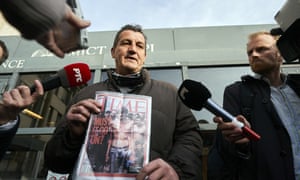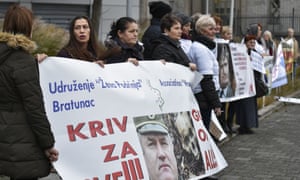
Mladi was one of the worlds most wanted fugitives before his arrest in 2011 in northern Serbia. He was transferred to the ICTY in the Netherlands, where he refused to enter a plea. A not guilty plea was eventually entered on his behalf. Through much of the trial in The Hague, he was a disruptive presence in court, heckling judges and on one occasion making a cut-throat gesture towards the mother of one of the 8,000 victims of the 1995 Srebrenica massacre.
Mladi was acquitted of only one charge, that of genocide in Bosnian municipalities outside Srebrenica. The chamber ruled that although he was part of a joint criminal enterprise to carry out mass killings there, which represented crimes against humanity, they did not rise to the level of genocide because the victims did not represent a substantial proportion of the Bosnian Muslim population of those municipalities.
The breakup of the former Yugoslavia
The breakup of the former Yugoslavia formally begins when Slovenia and Croatia declare independence. The Serb-led Yugoslav army withdraws from Slovenia after a 10-day conflict, but the war in Croatia that followed would last until 1995.
War breaks out in Bosnia
Bosnian Serbs swiftly take control of more than two-thirds of Bosnia and launch the siege of Sarajevo, headed by Ratko Mladi, who becomes the Bosnian Serb army commander a month later. The siege lasts 1,460 days, during which more than 11,500 people die.
Srebrenica massacre
Mladi’s troops capture Srebrenica, where more than 7,000 Muslim men and boys were killed, most by summary execution. Nato bombs Bosnian Serb positions following reports of the slaughter.
The international criminal tribunal for the former Yugoslavia indicts Mladi and Bosnian-Serb leader Radovan Karadi on charges including genocide.
Dayton agreement signed
The Dayton agreement is signed, ending the war and creating two mini-states in Bosnia: a Bosnian-Serb one and a Muslim-Croat one.
Mladi goes into hiding
Nato peacekeepers and western intelligence agencies operating in Bosnia step up attempts to track down war crimes suspects, but Mladi is sheltered by loyalists inSerbia. He is seen attending football games and eating at Belgrade restaurants.
Mladi arrested
Following intense pressure from the international community on Serbia, Mladi is arrested in Serbia.
He appears in court at the UN tribunal for the first time in June but refuses to enter pleas to the charges against him. At a second hearing in July, judges enter not guilty pleas on his behalf.
Trial hears closing statements
The trial in The Hague is arguably the most significant war crimes case in Europe since the Nuremberg tribunal, in part because of the scale of the atrocities involved. Over 530 days, the UN tribunal hears from 591 witnesses and examines nearly 10,000 exhibits concerning 106 separate crimes.
During closing statements, prosecutors urge judges to convict Mladi on all counts and sentence him to life in prison. Defence attorneys call for acquittal.
Mladi convicted
More than 20 years after the Srebrenica massacre, the now 74-year-old Mladi is sentenced to life imprisonment after being convicted of genocide, war crimes and crimes against humanity.
Delivering the verdicts, the judge said Mladis crimes rank among the most heinous known to humankind and include genocide and extermination.
The Bosnian Serb political leader, Radovan Karadi, was also found not guilty of genocide in the municipalities. That tribunal verdict in 2016 triggered protests from Bosniaks, who wanted the court to acknowledge that genocide was committed across Bosnia, not just in Srebrenica.
In evaluating Mladis culpability for genocide, the court pointed to his command and control of the Bosnian Serb army and interior ministry forces, which carried out almost all of the executions, his presence in the area, and his frequent remarks about how the countrys Muslims could disappear.
Orie said: The chamber found that the only reasonable inference was that the accused intended to destroy the Bosnian Muslim of Srebrenica as a substantial part of the protected group of Muslims in Bosnia Herzegovina.
Accordingly, the chamber found the accused intended to carry out the Srebrenica joint criminal enterprises through the commission of the crime of genocide and was a member of the Srebrenica joint criminal enterprise.
Once Mladic has exhausted any appeals, he could, theoretically, be sent to the UK to serve out the rest of his life behind bars. Britain is one of the countries that has signed up to the tribunals agreement on the enforcement of sentences.
The UK has hosted other Serbian convicts sent on from the ICTY. In 2010, Radislav Krsti who was convicted at the Hague in 2001 for his part in the Srebrenica massacre, had his throat slashed in his cell at Wakefield prison by three Muslim inmates intent on revenge.
The former Liberian warlord Charles Taylor is also serving out his 50 year prison term in a UK jail.
Mladic will remain in the UN detention centre at Scheveningen, near the Hague, in the meantime. Any appeal will be dealt with by the successor court, the UN Mechanism for International Criminal Tribunals.
The hearing, broadcast live, was followed closely in Bosnia. The Bosnian prime minister, Denis Zvizdi, said the verdict confirmed that war criminals cannot escape justice regardless of how long they hide.
In Lazarevo, the Serbian village where Mladi was arrested in 2011, residents dismissed the guilty verdicts as biased. One, Igor Topolic, said: All this is a farce for me. He [Mladi] is a Serbian national hero.
Mladis home village of Bozinovici retains a street named after the former general, where he is praised as a symbol of defiance and national pride.
The trial is one of the last to be heard by the ICTY, which is to be dissolved at the end of the year.

After the ruling, Serge Brammertz, the ICTYs chief prosecutor, said it was not a verdict against all Serb people. Mladis guilt is his and his alone, he said.
Mladis defence lawyer, Dragan Ivetic, announced that he would appeal against the convictions.
In Geneva, the UNs high commissioner for human rights, Zeid Raad al-Hussein, described Mladi as the epitome of evil and said his conviction was a momentous victory for justice.


